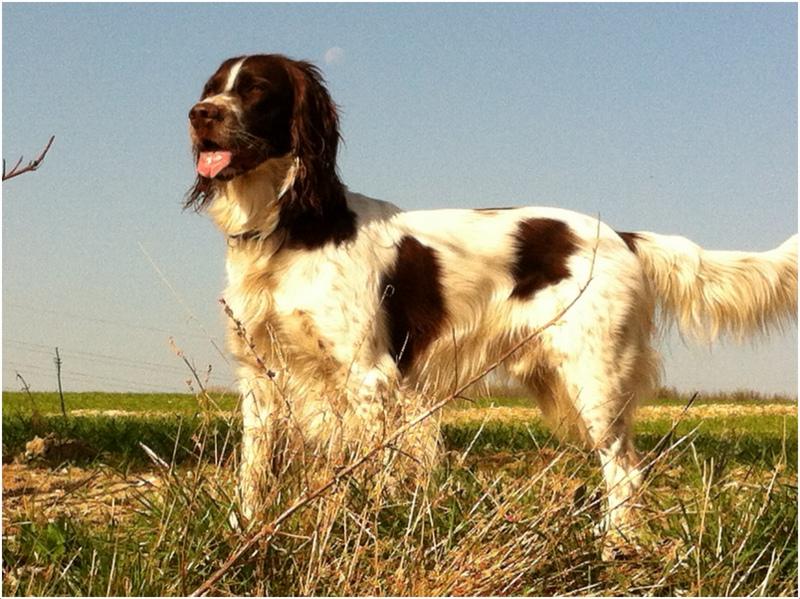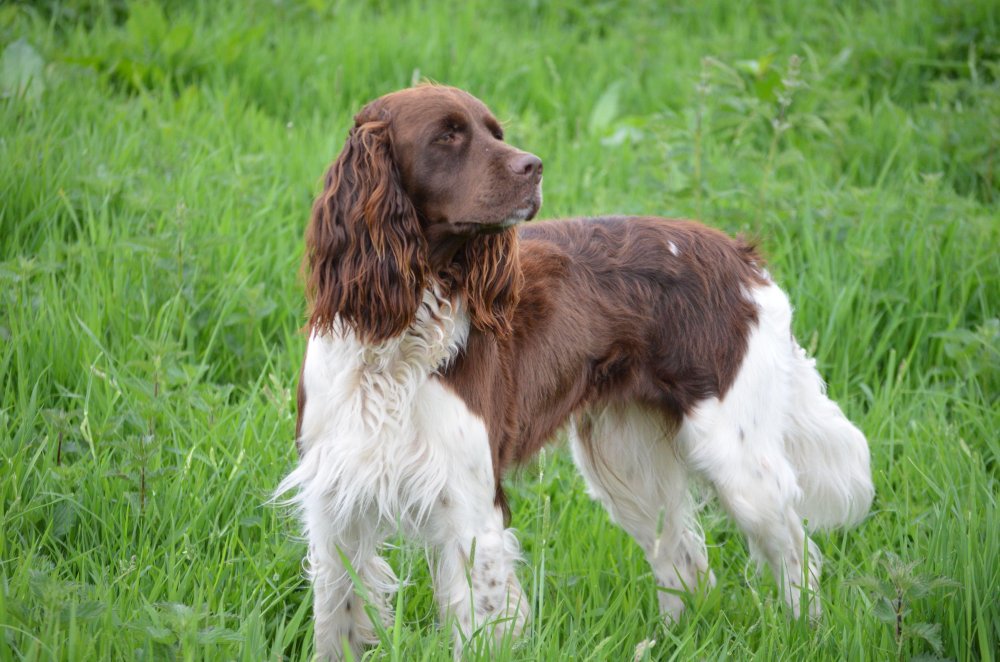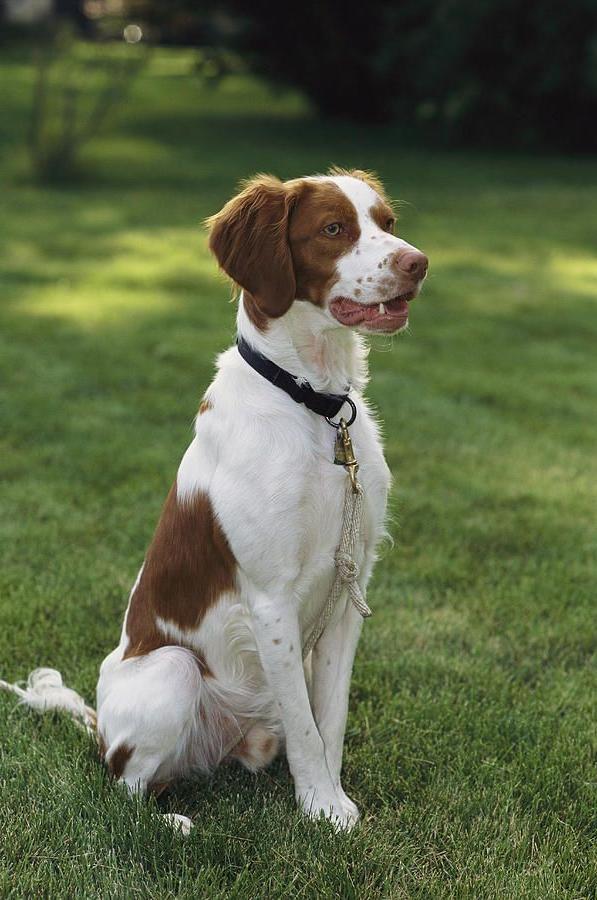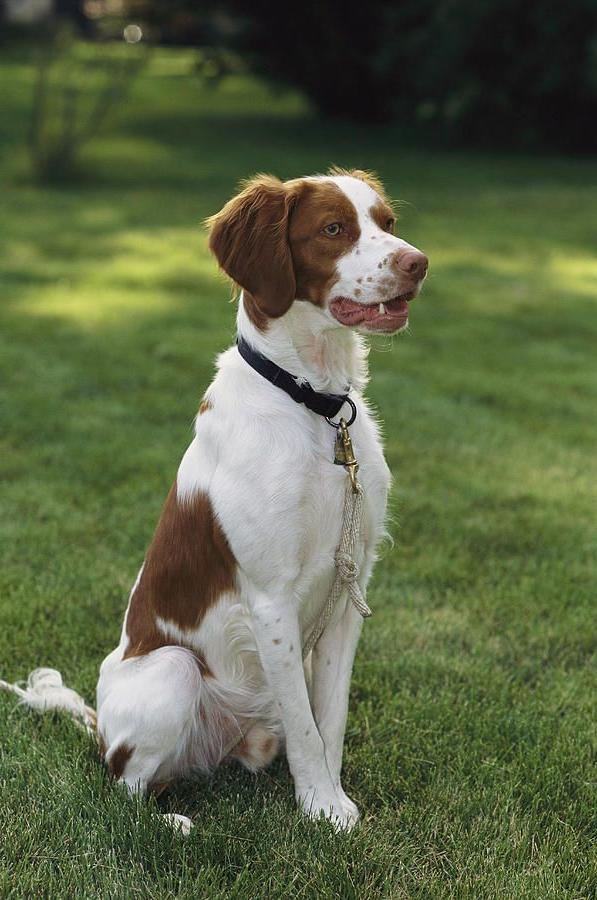- Breed Category: Sporting Group
- Country of Origin: France
- Average Height: Males 55-61 cm, Females 53-59 cm
- Average Weight: Males 24-27 kg, Females 20-25 kg
- Average Life Span: 10-12 years
- Grooming Requirements: Moderate, regular brushing needed
- Exercise Requirements: High, needs daily exercise
- Coat Type: Medium length, wavy
- Coat Color Variations: White with brown markings
- Shedding Level: Moderate
- Ear Type: Long, floppy
- Tail Type: Long, feathered
- Temperament: Friendly, intelligent, gentle
- Intelligence Level: High
- Barking Tendency: Low to moderate
- Compatibility with Children: Very good
- Compatibility with Other Pets: Generally good
- Training Ease: Relatively easy, eager to please
- Common Health Issues: Hip dysplasia, ear infections
- Dietary Needs: High-quality diet, balanced nutrition
- Energy Level: High
- Drooling Tendency: Low
- Sensitivity to Weather: Moderate, sensitive to heat
- Overall Maintenance Level: Moderate
- Original Purpose: Hunting, retrieving
- Year of Recognition by Kennel Clubs: 1955
- Apartment Friendly: Not ideal, needs space
- Best Suited For: Active families, hunters
- Cost of Ownership: Moderate to high
- Unique Traits: Excellent scenting ability
Ever found yourself overwhelmed by the sheer number of dog breeds out there? Choosing the right one can feel like a daunting task. Enter the French Spaniel, a breed that might just tick all your boxes. Known for its elegance and friendly nature, this breed is a hidden gem among dog enthusiasts.
The French Spaniel is a medium-sized dog with a rich history and a heart full of loyalty. Originally bred for hunting, these dogs are not only skilled in the field but also make wonderful companions at home. Their intelligence and gentle temperament make them a favourite for families and individuals alike.
This article aims to shed light on the French Spaniel’s unique characteristics, delve into its fascinating history, and provide insights into its care. Whether you’re a seasoned dog owner or a first-timer, understanding this breed could be the key to a rewarding companionship.
Early Development and Historical Significance

Early Development of the Breed
The French Spaniel traces its roots back to the Middle Ages, where it was developed as a versatile hunting dog. Its early development was focused on creating a breed that excelled in both pointing and retrieving game. This adaptability made it a favourite among hunters who needed a reliable partner in the field.
Role in Hunting and Retrieving
Renowned for its keen sense of smell and agility, the French Spaniel was a prized asset in hunting expeditions. Its ability to work tirelessly in various terrains made it indispensable for retrieving game birds. This breed’s natural instinct to retrieve and its gentle mouth ensured that the game was returned undamaged, a crucial trait for hunters.
Key Historical Figures and Regions
The breed’s development is closely linked to the French nobility, particularly in regions like the Loire Valley and Picardy. These areas were known for their rich hunting traditions, and the French Spaniel was a staple in the hunting parties of the aristocracy. Historical figures such as King Louis XII were known to favour this breed, further cementing its status.
Physical Characteristics
With a robust and athletic build, the French Spaniel is both elegant and functional. Its coat is typically medium-length, with a silky texture that provides protection in various weather conditions. The breed’s expressive eyes and friendly demeanour are complemented by its strong, muscular frame, making it both a beautiful and capable companion.
Appearance and Unique Traits
The French Spaniel stands out with its medium-sized, athletic build, exuding both elegance and strength. Its coat is a striking feature, usually medium-length and silky, often in shades of white with brown markings. These distinctive markings can vary, adding to the breed’s unique charm. The coat not only enhances its beauty but also serves a practical purpose, offering protection against the elements.
One can’t overlook the breed’s expressive eyes, which seem to convey a gentle and friendly nature. The French Spaniel’s strong, muscular frame is a testament to its hunting heritage, yet it carries itself with a grace that is truly captivating. This combination of elegance and functionality makes it a standout among dog breeds.
Temperament and Behaviour
Known for its gentle and friendly temperament, the French Spaniel is a joy to have around. It’s a breed that thrives on companionship, making it an excellent choice for families. These dogs are intelligent and eager to please, which makes training a rewarding experience. They are naturally sociable, getting along well with children and other pets.
While they are calm and composed indoors, they have a playful side that shines during outdoor activities. Their hunting background means they enjoy a good run or a game of fetch. This balance of calmness and playfulness makes the French Spaniel a versatile companion, ready to adapt to various lifestyles.
Personality and Suitability

Typical Personality Traits
The French Spaniel is known for its gentle and intelligent nature. These dogs are energetic, yet they maintain a calm and composed demeanour, making them a delight to be around. Their intelligence shines through in their ability to learn quickly and adapt to various situations, whether at home or in the field.
Suitability as a Family Pet and Hunting Companion
This breed is a perfect fit for families and hunting enthusiasts alike. Their gentle temperament makes them great companions for children, while their hunting instincts and agility make them reliable partners in the field. They are versatile dogs that can transition seamlessly from a family setting to a hunting environment.
Interaction with Children and Other Animals
French Spaniels are naturally sociable and get along well with children and other pets. Their friendly nature ensures they are patient and playful, making them ideal for households with kids. They are also known to be good with other animals, provided they are socialised from a young age.
Training and Exercise Needs
Training a French Spaniel is generally a rewarding experience due to their eagerness to please and quick learning ability. Regular exercise is essential to keep them happy and healthy. They enjoy activities like running, fetching, and exploring, which cater to their energetic nature and hunting background.
Training, Exercise, and Health
Importance of Early Training and Socialisation
Getting a head start on training and socialisation is crucial for French Spaniels. Early exposure to different environments, people, and other animals helps them grow into well-rounded adults. This breed is naturally sociable, but early training ensures they develop confidence and good manners.
Recommended Training Techniques
Positive reinforcement works wonders with French Spaniels. They respond well to praise, treats, and playtime as rewards. Consistency is key, so short, regular training sessions are more effective than long, sporadic ones. Their intelligence makes them quick learners, so keep training engaging and varied.
Daily Exercise Requirements and Activities They Enjoy
French Spaniels are active dogs that need daily exercise to stay happy and healthy. A good mix of walks, runs, and playtime is ideal. They love activities like fetch, agility courses, and even swimming. Keeping them physically and mentally stimulated prevents boredom and unwanted behaviours.
Health and Lifespan
Generally healthy, French Spaniels have a lifespan of around 10 to 14 years. Regular vet check-ups, a balanced diet, and proper exercise contribute to their well-being. Like all breeds, they can be prone to certain genetic conditions, so responsible breeding and regular health screenings are important.
Health and Care

Common Health Issues
French Spaniels are generally healthy, but like any breed, they can be prone to certain health issues. Hip dysplasia and ear infections are among the most common concerns. Regular vet check-ups can help catch these early, ensuring your furry friend stays in top shape.
Average Lifespan and Health Tips
With a lifespan of 10 to 14 years, French Spaniels can be long-term companions. To keep them healthy, provide a balanced diet, regular exercise, and mental stimulation. These dogs thrive on activity, so keeping them engaged is key to their well-being.
Preventative Care Recommendations
Preventative care is crucial. Regular vaccinations, flea and tick prevention, and dental care should be part of their routine. Regular grooming, especially ear cleaning, helps prevent infections. A proactive approach to health can save you from bigger issues down the line.
Grooming and Maintenance
Their medium-length, silky coat requires regular brushing to prevent matting and reduce shedding. A weekly brush should suffice, but during shedding seasons, more frequent grooming might be needed. Bathing should be occasional, as over-bathing can strip natural oils from their coat.
Coat Care and Grooming Routines

Shedding and Seasonal Grooming Tips
The French Spaniel’s coat is a standout feature, but it does require some attention. Regular brushing is key to keeping their silky fur in top condition. Aim for a weekly brush to prevent tangles and reduce shedding. During shedding seasons, usually in spring and autumn, you might need to up the frequency to a few times a week. This helps manage the extra hair and keeps your home a bit tidier.
Bathing should be occasional, as over-bathing can strip the coat of its natural oils. A good rule of thumb is to bathe them when they start to smell or look dirty. Always use a dog-friendly shampoo to maintain their coat’s health and shine.
Diet and Nutrition
A balanced diet is crucial for the French Spaniel’s overall health and well-being. High-quality dog food that meets their nutritional needs is essential. Look for options rich in protein, healthy fats, and essential vitamins. These dogs are active, so their diet should support their energy levels.
Portion control is important to prevent obesity, which can lead to health issues like joint problems. Always provide fresh water and consider consulting your vet for specific dietary recommendations tailored to your dog’s age, weight, and activity level.
Nutritional Needs and Feeding Guidelines
Nutritional Needs for Optimal Health
French Spaniels thrive on a balanced diet that supports their active lifestyle. High-quality dog food rich in protein, healthy fats, and essential vitamins is key. Look for options with real meat as the first ingredient, and avoid fillers like corn and soy.
Foods to Include and Avoid
Include lean meats, fish, and vegetables in their diet. Foods rich in omega-3 fatty acids, like salmon, can promote a healthy coat. Avoid processed foods, excessive grains, and anything with artificial additives. Chocolate, onions, and grapes are toxic to dogs and should be kept out of reach.
Feeding Schedules and Portion Recommendations
Divide their daily food intake into two meals to maintain energy levels. Portion sizes depend on age, weight, and activity level, so consult your vet for tailored advice. Always provide fresh water and monitor their weight to prevent obesity.
Fun Facts and Trivia
Did you know French Spaniels were once favoured by French royalty for their hunting prowess? Their keen sense of smell and agility made them indispensable in royal hunting parties. Despite their noble history, they remain down-to-earth companions today.
Interesting Tidbits and Famous French Spaniels

Interesting Tidbits about the Breed
The French Spaniel is not just a pretty face; it’s a breed with a rich tapestry of history and unique traits. Did you know that these dogs were among the first spaniels to be documented in literature? Their lineage can be traced back to the 14th century, making them one of the oldest spaniel breeds. They were originally bred for their versatility in hunting, excelling in both pointing and retrieving. This adaptability is still evident today, as they seamlessly transition from being a family pet to a hunting companion.
Famous French Spaniels in Media or History
While the French Spaniel may not be as widely recognised in media as some other breeds, it has had its moments of fame. Historically, they were favoured by French royalty, including King Louis XII, who appreciated their hunting skills and gentle nature. In more recent times, the breed has been featured in various dog shows and competitions, showcasing their intelligence and agility. Their noble history and charming personality continue to make them a beloved choice for those in the know.
Final Thoughts

The French Spaniel is a versatile and loyal companion. Its blend of elegance and functionality makes it a standout choice for active families and hunting enthusiasts. With its rich history and gentle temperament, this breed offers both companionship and utility, thriving in environments that appreciate its intelligence and energy. Embracing a French Spaniel means welcoming a dog that is both a loving family member and a capable partner in adventure. Consider this breed if you’re ready for a rewarding journey with a devoted and dynamic canine friend.
